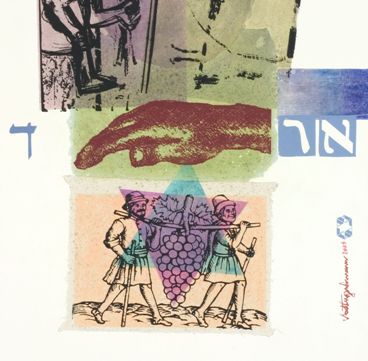The Anomalously Visionary Discourse of Moacyr Scliar
DOI:
https://doi.org/10.17851/1982-3053.7.13.133-148Keywords:
Moacyr Scliar, Prophets, Feminine ScriptureAbstract
This study examines the discourse produced, under the effects of supernatural inspiration, by the visionary characters in the narrative of Moacyr Scliar. The short story “Os profetas de Banjamim Bok” and the novel A estranha nação de Rafael Mendes offer diverse manifestations of inspired speech, mixing the conventions of prophetic and apocalyptic literature with elements derived from other eras and cultures. In the ingenious novel A mulher que escreveu a Bíblia, one finds a fusion of the traditional belief in revealed writing with some concepts typical of late twentieth-century feminism, centering on woman, her body, and her writing.
Downloads
References
BARR, Lois Baer. The Jonah Experience: The Jews of Brazil according to Scliar. In: BARR, Lois; SHEININ, David (Org.) The Jewish Diaspora in Latin America: New Studies on History and Literature. Nueva York: Garland Press, 1996. p. 33-52.
BLOOM, Harold. Introduction. Bloom y David Rosenberg. In: ______.The Book of J. Trad. Rosenberg. Intro. Bloom. Nueva York: Grove Press, 1990. p. 9-55.
CIXOUS, Hélène. The Laugh of the Medusa. Trad. Keith Cohen y Paula Cohen. In: WARHOL, Robin R.; HERNDL, Diane Price (Org.). Feminisms: An Anthology of Literary Theory and Criticism. Ed. rev. New Brunswick, New Jersey: Rutgers University Press, 1997. p. 347-362.
COLLINS, John J. The Apocalyptic Imagination: An Introduction to Jewish Apocalyptic Literature. Grand Rapids, Michigan: William B. Eerdmans, 1998.
COOK, Albert. The Burden of Prophecy: Poetic Utterance in the Prophets of the Old Testament. Carbondale, Illinois: Southern Illinois University Press, 1996.
GLICKMAN, Nora. Moacyr Scliar. In: LOCKHART, Darrell (Org.). Jewish Writers of Latin America: A Dictionary. Nueva York: Garland Press, 1997. p. 464-73.
HANSON, Paul D. The Dawn of Apocalyptic. Philadelphia: Fortress Press, 1975.
HESCHEL, Abraham J. What Manner of Man Is the Prophet? The Prophets. Ed. original 1962. Nueva York: Harper Perennial Classics, 2001. p. 3-31.
IGEL, Regina. Imigrantes judeus / escritores brasileiros. São Paulo: Editora Perspectiva / Banco Safra. 1997.
LINDSTROM, Naomi. Oracular Jewish Tradition in Two Works by Moacyr Scliar. Luso-Brazilian Review, v. 21, n. 2, p. 23-33, 1984.
MIRON, Dan. From Continuity to Contiguity: Toward a New Jewish Literary Thinking. Stanford: Stanford University Press, 2010.
NURIEL, Patricia. La ”reparación del mundo” y de la historia judía brasileña en O ciclo das águas de Moacyr Scliar. Revista Iberoamericana, n. 230, p. 101-113. eneromarzo 2010.
OLIVEIRA, Emanuelle. O gusto amargo da festa: produção literária e momento politico no Brasil, 1960-1990. Luso-Brazilian Review, v. 37, n. 1, p. 107-16, 2000.
PIROTT-QUINTEIRO, Laura E. A Centaur in the Text: Negotiating Cultural Multiplicity in Moacyr Scliar’s Novel. Hispania, n. 83, p. 768-78. dic, 2000.
RICHARD, Nelly.¿Tiene sexo la escritura?. Masculino/femenino: prácticas de la diferencia y cultura democrática. Santiago: Francisco Zegers, p. 30-45, 1993.
RINGGREN, Helmer. Prophecy in the Ancient Near East. In: COGGINS, Richard; PHILLIPS, Anthony; KNIBB, Michael (Comp.). Israel’s Prophetic Tradition: Essays in Honor of Peter R. Ackroyd. Cambridge: Cambridge University Press, 1982. p. 1-11.
SCHMITHALS, Walter. The Apocalyptic Movement: Introduction and Interpretation. Trad. John E. Steely. Nashville/New York: Abingdon P., 1975.
SCLIAR, Moacyr. A balada do falso Messias. In: _______. A balada do falso Messias. São Paulo: Ática, 1976. p. 11-19.
SCLIAR, Moacyr. A estranha nação de Rafael Mendes. Porto Alegre: L&PM Editores, 1983.
SCLIAR, Moacyr. A mulher que escreveu a Bíblia. São Paulo: Companhia das Letras, 1999.
SCLIAR, Moacyr.Os profetas de Benjamim Bok. O anão no televisor. Porto Alegre: RBS/Editora Globo, 1979. p. 1-11.
SZKLO, Gilda Salem. O bom fim do shtetl: Moacyr Scliar. São Paulo: Perspectiva, 1990.
VIEIRA, Nelson H. Judaic Fiction in Brazil: To Be and Not to Be Jewish. Latin American Literary Review, v. 14, n. 28, p. 31-45, julio-diciembre 1986.
VIEIRA, Nelson H. Moacyr Scliar: Social Difference and the Tyranny of Culture. Jewish Voices in Brazilian Literature: A Prophetic Discourse of Alterity. Gainesville, Florida: University of Florida Press, p. 151-92, 1995.
VIEIRA, Nelson H. Post-Holocaust Literature in Brazil: Jewish Resistance and Resurgence as Literary Metaphors for Brazilian Society and Politics. Modern Language Studies, v. 16, n. 1, p. 62-70, 1986.
WALDMAN, Berta. Os caminhos da ficção de Moacyr Scliar.Arquivo Maaravi: Revista Digital do Núcleo de Estudos Judaicos da UFMG. Belo Horizonte, v. 6, n. 11, out. 2012.
Downloads
Published
How to Cite
Issue
Section
License
Os direitos autorais pertencem exclusivamente aos autores. Os direitos de licenciamento utilizados pelo periódico é a licença Creative Commons Attribution 4.0 (CC BY 4.0): são permitidos o compartilhamento (cópia e distribuição do material em qualquer meio ou formato) e adaptação (remix, transformação e criação de material a partir do conteúdo assim licenciado para quaisquer fins, inclusive comerciais.






